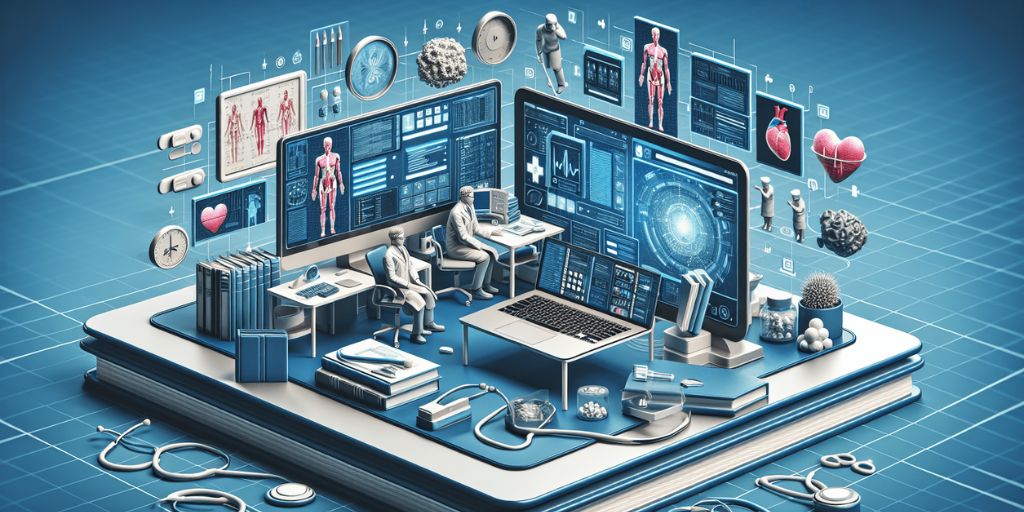
The rise of online education is revolutionizing the way healthcare professionals are trained in the UK. This shift not only enhances accessibility but also offers a flexible approach to learning. Discover how digital platforms are reshaping healthcare training and what it means for the future of the sector.
The transformation of UK healthcare training through online education is a significant development that has been gaining traction in recent years. As the healthcare industry becomes more complex, the demand for continuous learning and specialized training grows. Online education provides a solution that meets these needs while overcoming traditional barriers such as geographical limitations and rigid schedules.
The benefits of online education for healthcare professionals
Online education offers numerous advantages for healthcare professionals seeking to advance their knowledge and skills. One of the key benefits is the flexibility it provides, allowing learners to study at their own pace and on their own schedule. This is particularly important for those juggling work commitments and personal responsibilities. For instance, RN to NP programs offer nurses an opportunity to progress in their careers without having to take extended time off from their jobs.
Additionally, online courses often incorporate interactive elements such as virtual simulations and case studies, which enhance the learning experience. These tools can provide realistic scenarios that prepare healthcare professionals for real-world situations. The ability to access a wide range of resources and expert knowledge from across the globe further enriches the educational experience.
Furthermore, online education can be cost-effective for both learners and institutions. By eliminating the need for physical classrooms and associated expenses, online courses can be offered at a lower cost than traditional programs. This affordability makes high-quality education more accessible to a broader range of individuals, helping to diversify the healthcare workforce and improve patient care.
Improving accessibility and inclusivity
One of the most significant impacts of online education is its ability to improve accessibility and inclusivity in healthcare training. By removing geographical barriers, individuals from remote areas or those with mobility issues can participate in high-quality educational programs that were previously out of reach. This democratization of education ensures that more people have the opportunity to pursue careers in healthcare, which is essential for addressing workforce shortages and enhancing patient care.
In addition, online education can accommodate different learning styles and needs. For example, courses can be tailored with various formats such as video lectures, written materials, and interactive quizzes, allowing learners to choose the method that works best for them. This personalized approach helps ensure that all students can succeed regardless of their background or circumstances.
Online education also promotes inclusivity by fostering a diverse learning community. Learners from different backgrounds, cultures, and experiences can come together in virtual classrooms, enriching discussions and promoting cultural competence. This exposure to diverse perspectives is essential for healthcare professionals, as it prepares them to provide care to patients from various backgrounds and to work effectively in multicultural teams.
The role of technology in shaping future training
Technology plays a crucial role in transforming healthcare training through online education. Advances in digital tools and platforms have made it possible to deliver high-quality content in an engaging and accessible manner. Features like artificial intelligence (AI) and machine learning are being integrated into educational programs to provide personalized learning experiences and real-time feedback.
Moreover, technologies such as virtual reality (VR) and augmented reality (AR) are being used to create immersive learning environments. These innovations allow healthcare professionals to practice procedures and develop skills in a safe, controlled setting before applying them in real-world situations. The continued evolution of these technologies promises even greater enhancements in the quality and effectiveness of healthcare training.
In addition to VR and AR, cloud computing and mobile technologies are making online education more accessible and convenient. Learners can access course materials, participate in discussions, and complete assignments from any device with an internet connection. This flexibility allows healthcare professionals to fit learning into their busy schedules, ensuring that they can continuously update their knowledge and skills without sacrificing their work or personal commitments.
The future of online education in healthcare training
The future of healthcare training is undoubtedly moving closer to greater reliance on online education. The ongoing advancements in technology, coupled with the increasing need for flexible learning solutions, make this shift inevitable. Healthcare institutions are recognizing the value of digital education platforms and are investing in their development to ensure they remain at the forefront of medical training.
As online education continues to evolve, it will play an increasingly critical role in preparing healthcare professionals for the challenges they face. The ability to access up-to-date information, learn from global experts, and engage with cutting-edge technology will equip them with the skills necessary to provide high-quality care.












